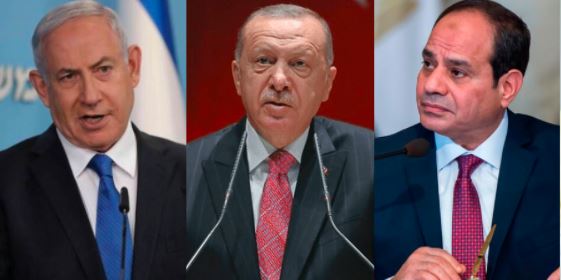Turkey’s madmen President and ruler Recep Tayyip Erdogan has charted a new, uncharacteristic route of ‘normalisation’ of ties with the enemy states. Turkish news sources quoting government officials, recently revealed that talks between Turkey and Egypt were underway regarding the restoration of ties and energy-related cooperation in the Eastern Mediterranean. Similarly, Turkey and Israel were in talks over possible energy cooperation with the Arab nations like Saudi Arabia and UAE, being the next target of Erdogan’s newfound ‘serenading’ plans.
The reason for Turkey’s sudden change in its stance comes in the backdrop of a failing economy that has been in a tailspin for the better part of the last two years with the COVID-19 pandemic wrecking it even further. Recently, Turkey’s currency ‘Lira’ tumbled as much as 15 per cent after Erdogan sacked the country’s central bank governor.
Naci Agbal had been raising interest rates to fight an inflation rate running above 15 per cent. The fallout from the sacking hit shares on the Istanbul stock exchange and raised concerns about the impact of Turkey’s borrowing costs.
And it does not help the flailing economy that Erdogan has put up several war fronts with neighbouring as well as distant countries. In an attempt to reclaim the lost glory of the Ottoman Empire, Erdogan has quite literally burnt his country to the ground.
Read more: Erdoğan has made sure that Turkey has some bad, very bad days ahead
The fact that Turkey has prostrated in front of Egypt and Israel can be gauged by the fact that the two countries had recently shaken hands with each other. As reported by TFI, Egypt’s Energy Minister Tarek el-Molla visited Israel to meet PM Benjamin Netanyahu. Together the duo discussed the volatile region of the Mediterranean and how the discovery of natural gas in the region was an “amazing opportunity” for cooperation between Israel, Egypt, and other countries on energy and other matters. In a nutshell, Tarek and Netanyahu discussed plans to keep an increasing radical country like Turkey at bay in the region.
Sensing that these two countries were growing closer and could potentially harm Turkish interests, Erdogan thought that surrendering himself would be the best bet to get out of this tough situation. Furthermore, the growing anger of the public with rising inflation was something that Erdogan could not hold off longer.
Reported by TFI extensively, a joint declaration was signed in May last year by a combined bloc of Cyprus, Egypt, France, Greece, and the UAE denouncing Turkey’s illegal drilling efforts around Cyprus, its military intervention in Libya, and its maritime borders deal with the GNA. The collective front by the aforementioned nations has finally paid dividends as Ankara looks to satiate the aggravated parties.
However, it will need to be seen how Turkey plays out the situation in Libya as it will determine how seriously the Arab world takes its ‘normalisation’ pleas. Since last year, Turkey had been planning to overthrow Saudi Arabia as the de facto leader of the Arab world and take its spot by proclaiming itself as the Caliph.
To reach such devious ends, Turkey had sided with Pakistan and had constantly undermined KSA on the world stage. Meanwhile, the UAE will still be on the fence about cooperating with Turkey and it will take some mollycoddling if Ankara is to earn the approval of the gulf country.
However, with such weak financial fundamentals, it was only a matter of time before Ankara had to give up on its world domination plans. The ‘normalisation’ of ties is just a fancy way to wrap the notion that Turkey has finally realised its folly and is looking for making quick amends.
